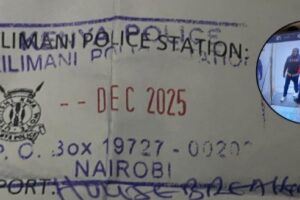The murder of lawyer Mathew Kyalo Mbobu has opened old wounds in Nairobi’s political history and dragged back names that many thought had faded away.
The arrest of George Wainaina, a man known not just as KANU’s Secretary General but more importantly as Evans Kidero’s close ally and Chief of Staff during his governorship, has raised uncomfortable questions.
Wainaina is now at the heart of this investigation, and his connection to Kidero has put the former governor back under a harsh spotlight.
For Kenyans, this is not only about a brutal killing on Magadi Road, it is about the long trail of corruption, shady dealings, and questionable friendships that defined Kidero’s years in power.
Mbobu was a respected lawyer, known for handling tough cases involving money and politics. His killing was chilling in its precision. He was ambushed on his way home, shot multiple times at close range, and left for dead. Witnesses described a violent and planned hit, with the attackers fleeing in a way that suggested experience and coordination.
Police quickly tied the case to financial disputes, pointing out that Mbobu had met some of the suspects earlier that day over business disagreements. But what shocked many was the arrest of Wainaina, a man deeply tied to one of Nairobi’s darkest chapters of leadership under Kidero.
The mention of Wainaina’s name immediately brings back the scandals of City Hall. As Chief of Staff, he was Kidero’s enforcer, a man many considered ruthless. Both of them were arrested in 2019 over the irregular payment of 68 million shillings to a law firm, just one of the many cases of financial mismanagement during that period.
Nairobi, under Kidero’s leadership, became synonymous with corruption and poor governance. Services collapsed while billions disappeared. Now, seeing Wainaina implicated in a case involving murder and huge sums of money being recovered from suspects’ homes has reignited suspicions about the networks Kidero cultivated and protected.
Kidero has so far stayed silent, but that silence is loud. He may not be a suspect in this murder, but the shadow of his past looms large. Wainaina did not operate in a vacuum. He was part of the machinery that allowed Nairobi’s rot to deepen.
Allegations of land grabbing, theft of county funds, and a culture of impunity flourished during those years. Today, as Wainaina faces questions in a murder investigation, it reminds the public that Kidero’s legacy is still toxic, still shaping lives long after he left office.
The authorities are treating this case seriously. The Director of Public Prosecutions has demanded answers, while Interior CS Kipchumba Murkomen has condemned the killing. But beyond official statements, Kenyans are asking whether this will finally shine a light on the darker truths of Kidero’s leadership.
The money trails, the loyal allies, and the corruption that thrived under his watch cannot be separated from what is happening now.
For Mbobu’s family, the demand is simple: justice. For the public, the hope is that justice will not stop at the gunmen or their immediate financiers but will expose the bigger web of power and impunity that has long gone unchecked.
Wainaina’s arrest could be the thread that unravels a much larger story. And if it does, Kidero’s name will once again stand where it has always belonged in the eyes of many Nairobians, at the center of failure, corruption, and betrayal of public trust.





















Add Comment